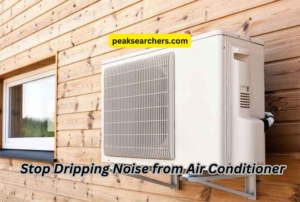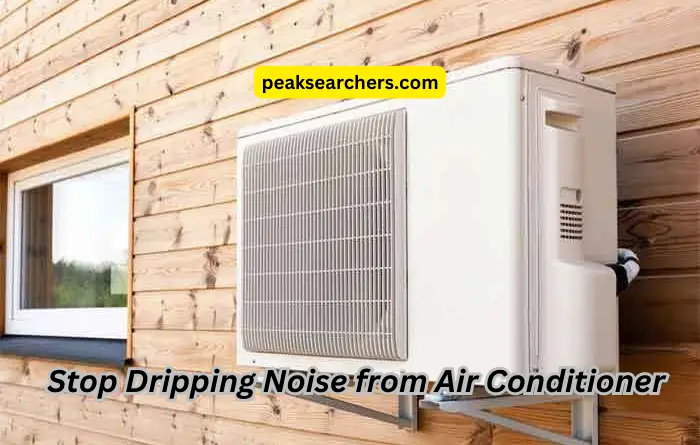How to Stop Dripping Noise from Air Conditioner? A DIY Guide
If you’ve ever heard a dripping noise coming from your air conditioner, you know how annoying it can be. But not only is it a nuisance, but it can also indicate a problem with your AC system that needs to be addressed.
When I got a new AC, an annoying sound was being produced due to which I complained to the company about it. But, when I knew the reason for the noise, I was amazed at how simple the soltution was.
In this article, we will provide you with some simple and effective tips on how to stop the dripping noise from your air conditioner.

Causes of Dripping Noise from Air Conditioners
- Clogged Drain Line: A clogged drain line is one of the most common causes of dripping noise from air conditioners. When the drain line is blocked, the water can’t flow out of the unit properly, and it ends up dripping onto the floor or making a dripping sound.
- Low Refrigerant: Low refrigerant levels can cause the evaporator coil to freeze, which can lead to a dripping noise when the ice melts. This is a serious problem that requires professional attention.
- Dirty Air Filter: A dirty air filter can cause the evaporator coil to freeze, leading to dripping noise. It’s important to change your air filter regularly to prevent this from happening.
- Improper Installation: If your air conditioner was installed improperly, it could be causing the dripping noise. This is because the condensate drain line may not be installed at the correct angle, which can lead to water build-up and dripping noise.
- Faulty Condensate Pump: A faulty condensate pump can also cause dripping noise. This pump is responsible for pumping water out of the unit, so if it’s not working properly, water can build up and cause dripping noise.
Check the Condensate Drain Line
One of the most common reasons for a dripping noise from an air conditioner is a clogged condensate drain line. This drain line is responsible for removing condensation from the air conditioner’s evaporator coil. If it becomes clogged, the condensation can back up and cause the dripping noise.
To check the condensate drain line, locate it near the outdoor unit of your air conditioner. If you see standing water or debris in the line, it may be clogged. Clear any debris you see and flush the line with water to remove any remaining blockage.
Replace the Air Filter
A dirty air filter can also cause a dripping noise from your air conditioner. When the air filter becomes clogged, it can restrict the airflow through the evaporator coil, causing it to freeze up. When the ice melts, it can result in the dripping noise you hear.
To avoid this problem, replace your air filter regularly. This will help keep your system running smoothly and prevent any unnecessary repairs.
Inspect the Evaporator Coil
If your air conditioner’s evaporator coil is dirty or damaged, it can also cause a dripping noise. The evaporator coil is responsible for absorbing heat from the air in your home. If it becomes dirty or damaged, it can freeze up and cause a dripping noise.
Inspect the evaporator coil for any visible signs of dirt or damage. If you see any, clean the coil or replace it if necessary.
Check the Refrigerant Levels
Low refrigerant levels can also cause a dripping noise from your air conditioner. When the refrigerant levels are low, the evaporator coil can freeze up, causing the dripping noise.
To check your refrigerant levels, you will need to hire a professional HVAC technician. They can check the levels and recharge your system if necessary.
Schedule Regular Maintenance
Regular maintenance is key to preventing any problems with your air conditioner. Schedule annual maintenance with a professional HVAC technician to keep your system running smoothly and efficiently.
Use a Drip Pan
If you have tried all of the above solutions and the dripping noise still persists, you may want to consider installing a drip pan underneath your air conditioner. A drip pan can catch any excess water and prevent it from damaging your floors or walls.
Be sure to regularly check the drip pan and empty it if necessary to prevent any overflow.
Call a Professional
If you are still having trouble with a dripping noise from your air conditioner, it’s best to call a professional HVAC technician. They can inspect your system and diagnose any underlying issues that may be causing the problem.
Additionally, a professional can perform any necessary repairs or maintenance to keep your system running smoothly and efficiently.
Additional Step
In addition to the above tips, there are a few more things you can do to prevent a dripping noise from your air conditioner.
- First, make sure that your air conditioner is installed correctly. Improper installation can lead to a variety of problems, including a dripping noise. If you suspect that your air conditioner was not installed correctly, contact a professional to inspect it and make any necessary adjustments.
- Second, keep your air conditioning unit clean and free from debris. This includes the outdoor unit, as well as any indoor components. Dirt, leaves, and other debris can cause blockages and restrict airflow, leading to a dripping noise.
- Finally, make sure that your air conditioner is the appropriate size for your home. If it is too small, it will have to work harder to cool your home, which can lead to a variety of problems, including a dripping noise. If you suspect that your air conditioner is undersized, contact a professional to assess your needs and recommend a suitable replacement
Also Read: How To Clean Air Conditioner Outside Unit – A DIY Solution
FAQs
How to reduce AC noise in the apartment?
- Choose a quiet AC unit: When selecting an AC unit, look for models that have a low decibel (dB) rating. The lower the dB rating, the quieter the unit will be.
- Install vibration pads: AC units can create vibrations that contribute to noise. You can reduce these vibrations by installing vibration pads under the AC unit. These pads will absorb the vibrations and reduce the noise.
- Use a sound blanket: A sound blanket is an acoustic barrier that can be installed around the AC unit. The blanket will absorb the sound waves and reduce the noise.
- Soundproof the wall: If the AC unit is mounted on an external wall, soundproofing the wall can help reduce the noise. You can use acoustic insulation or soundproofing panels to reduce noise transmission.
- Close windows and doors: Closing windows and doors can help reduce the amount of outside noise that enters your apartment. This can help reduce the overall noise level in your apartment.
- Use noise-canceling headphones: If all else fails, you can use noise-canceling headphones to block out the noise. This can be especially helpful when you are trying to sleep or work.
Do air conditioner sound blankets work?
Sound blankets work by absorbing the sound waves produced by the AC unit. When sound waves hit the blanket, the material inside the blanket converts the sound energy into heat energy, effectively reducing the noise level. The thicker and denser the blanket, the more effective it will be at absorbing sound.
It is important to note that sound blankets are not a complete solution for reducing AC noise. They can help reduce the noise level, but they will not eliminate it completely. It is recommended to use a combination of noise-reducing methods, such as sound blankets, vibration pads, and soundproofing, for the best results in reducing AC noise.
How To Fix Outdoor air conditioner noise reduction?
- Relocate the unit: If possible, relocate the outdoor AC unit to a less noisy area of the property. This could be a location that is further away from neighboring properties or an area with natural sound barriers like trees or bushes.
- Install a sound barrier: Installing a sound barrier around the AC unit can help reduce the noise it produces. This can be achieved by building a fence or wall around the unit, or by using soundproofing materials.
- Use a vibration pad: Vibration pads can help reduce the amount of vibration that the AC unit produces, which in turn can reduce noise. These pads are typically made of rubber or foam and are placed under the unit to absorb vibrations.
- Install a sound blanket: As mentioned in the previous answer, sound blankets can also be effective for outdoor AC units. These blankets are installed around the unit and absorb the sound waves it produces.
- Regular maintenance: Performing regular maintenance on the AC unit can also help reduce noise. This includes cleaning the unit, replacing filters, and checking for loose parts that may be causing excessive vibration.
By implementing these tips, you can significantly reduce the noise produced by your outdoor air conditioning unit, making it a more enjoyable environment for you and your neighbors.
Is dripping noise from an air conditioner harmful?
Dripping noise itself is not harmful, but it’s a sign that something is not right with your AC unit. Ignoring the problem can lead to further damage and potentially expensive repairs.
Can I fix low refrigerant levels myself?
No, low refrigerant levels require professional attention. Attempting to fix this problem yourself can be dangerous and may cause further damage to your AC unit.
How often should I change my air filter?
It’s recommended to change your air filter every 1-3 months, depending on usage.
Also Read: How To Make An Air Conditioner Run Colder – A Comprehensive Guide
Conclusion
In conclusion, a dripping noise from your air conditioner can be a sign of a more significant problem that needs to be addressed. By following these simple tips, you can stop the dripping noise and keep your AC system running smoothly. Remember to schedule regular maintenance to keep your system in top condition.


